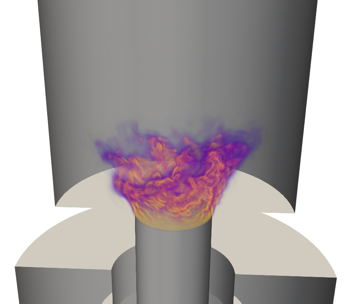Understanding and PredictingHydrogen Combustion
18th – 20th December 2023
Barcelona Supercomputing Centre, BSC Auditorium (S1-2-1)
Plaça Eusebi Güell, 1-3, 08034 Barcelona, Spain
Registration is now closed
Please contact admin@cado-ercoftac.org if you have any questions.
Current EU decarbonization strategies are promoting the use of green hydrogen across different sectors from energy power and power generation to transportation i.e., automotive, marine and aerospace. In these applications, the hydrogen is converted directly into electricity by using fuel cells or heat by combustion.
In the Center of Excellence in Combustion (CoEC), new methodologies for the efficient simulation of these technologoes in the future Exascale systems are developed and applied to some fundamental challenges in these sectors.
Within this frame, this training course is bringing together a set of experts to discuss the challenges and opportunities for the utilization of hydrogen and provide the attendees with some fundamental understanding of the physics and methodologies that can be used to simulate hydrogen flames in practical applications.
The course is divided into three main parts:
- Description of the context from production, and storage to utilization.
- Theory and fundamentals of H2 combustion.
- Numerical methods and tools for post-processing and analysis.
This training is split into 3 days from Monday to Wednesday and is hosted at the Barcelona Supercomputing Center (BSC), which is a national research facility managing the supercomputer MareNostrum 4.
During these days, discussions on the use of hydrogen to assist in the decarbonization strategies of the EU for different sectors will be discussed across the three days along with lectures describing the modelling and simulation requirements of different application.
REGISTRATION FEES:
The registration fee will include lunch, coffee and tea over the 3-day meeting. Please note, course fees do not include accommodation.
- Please contact ERCOFTAC CADO: admin@cado-ercoftac.org if you have any questions.
Due to the structure of the training which includes apart from lectures also the open sessions and hands on activities we can only offer possibility to attend in person.
Programme:
18/12/2023 – Day 1: Role of Hydrogen in the Energy and Transportation Green Transition
This session introduces the context and market opportunities of hydrogen across different sectors from production to utilization. External speakers from industry and academia will give lectures on the application of hydrogen for power generation and transportation.
09:00 – 09:15
09:15 – 10:15
10:15 – 11:15
11:15 – 11:45
11:45 – 12:30
12:30 – 13:15
13:15 – 14:45
14:45 – 15:30
15:30 – 16:15
16:15 – 17:00
17:00 – 17:15
Welcome and introduction
Part I: The Hydrogen Economy: A Background
The Role of Hydrogen in a Sustainable Energy System
Albert Tarancon (IREC)
Fuel Cells and Their Applications
Maria Serra (CSIC-UPC)
Coffee break
Part II: Utilization of Hydrogen by Industrial Sector
Challenges and Current Developments for Hydrogen Ground Mobility
Olivier Laget (IFPEN)
Hydrogen-powered Aircraft - Introduction to the Main Challenges
Anais Marie Gay (Airbus)
Lunch
Challenges for Ammonia Engines
Christine Rouselle (University of Orléans)
Clean Hydrogen Power Generation in Gas Turbines
Lukasz Panek (Siemens AG)
Potentials and Challenges of Hydrogen to Decarbonize the Steel Sector
Sébastien Caillat (Fives Stein)
Conclusions and Outlook
19/12/2023 – Day 2: From Theory to Simulation of Hydrogen Flames
This session introduces the fundamentals of hydrogen combustion from theory to simulations using high-fidelity methods. It includes lectures and hands on activities where the students can utilize the physical models and numerical methods described in the lectures.
09:30 - 11:00
Theory and Fundamentals of H2 Combustion I
Prof. Heinz Pitsch (RWTH Aachen University)
11:00 - 11:30
Coffee break
11:30 - 13:00
Theory and Fundamentals of H2 Combustion II
Prof. Thierry Poinsot (IMFT)
13:00 - 14:30
Lunch break
14:30 - 16:00
Numerical Methods for Turbulent Reactive Flows
Prof. Ananias Tomboulides (Aristotle University of Thessaloniki)
Dr Daniel Mira (Barcelona Supercomputing Center)
16:0 - 17:30
Hands-on Exercises I
This hands-on session is focused on the computation and characterization of hydrogen flames using the Cantera software. The effects of chemistry and transport will be discussed in the context of 1D flames with emphasis on the chemistry description and the flame structure.
20/12/2023 - Day 3: Understanding and Predicting Hydrogen Flames
9:30 - 11:00
Hands-on Exercises II
This hands-on session is focused on the study of numerical methods applied to the solution of reactive flow simulations. The students will have the opportunity to select different numerical methods and explore their influence on the accuracy and cost of the simulations in the context of hydrogen flames. Laminar flames and weakly turbulent flames will be used as examples.
11:00 - 11:30
Coffee break
11:30 - 13:00
Data-driven Analysis of Turbulent Reactive Flows
Prof. Alessandro Parente (Université libre de Bruxelles)
Alberto Procacci (Université libre de Bruxelles)
13:00 - 14:30
Lunch break
14:30 - 17:30
Hands-on Exercises III
The last hands-on session is focused on the study of the methodologies used for the analysis of massive databases. These methodologies are a common feature to be able to automatically extract non-linear dependency among the quantities of interest. The students will have the possibility to learn more about the structure of data-driven algorithms, explore the effects of tuning parameters on the models extracted and their accuracy. Laminar flames and weakly turbulent flames will be used as examples.
Full Programme can be downloaded here


ACCOMMODATION:
- Residencia Universitaria Torre Girona (next to the BSC)
Psg. Dels Til.lers, 19; 08034-Barcelona
Tel. +34 93 390 43 00
Email: torregirona@resa.es
Double for single use: aprox. 78-88 €
- Other university residences in Barcelona: www.resa.es
- List of hotels is available below:



